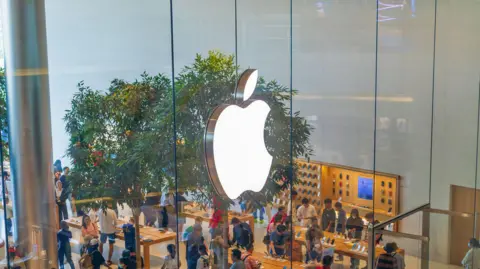In a significant revelation, Tulsi Gabbard, the head of U.S. National Intelligence, stated that she was not notified about the United Kingdom’s request to access encrypted data from Apple customers globally. This disclosure raises questions around privacy rights and jurisdictions as governments increasingly seek access to user data in the realm of surveillance and security.
Ms. Gabbard expressed her concerns in a recent letter in which she indicated intentions to gather more information from both the FBI and various other U.S. intelligence agencies. The letter emphasized her apprehensions, labelling the UK’s actions as an “egregious violation” of the privacy rights of American citizens. This strong language underscores a growing tension between privacy and national security interests, especially in an era where digital data is paramount.
The UK’s Home Office issued a notice to Apple under the Investigatory Powers Act, a legal framework that governs how state authorities can access electronic communications and surveillance. By design, this notice cannot be disclosed publicly, which gives rise to transparency issues surrounding governmental conduct that may infringe on individual privacy rights. The issuance took place in January, marking a pivotal moment in how governments may leverage laws like the Investigatory Powers Act to demand data access without informing the relevant parties, in this case, the United States.
In her correspondence, Gabbard also mentioned her pursuit of legal advice regarding potential breaches of an agreement between the UK and the U.S. This bilateral accord ideally is meant to prevent either country from demanding access to data belonging to the other nation’s citizens without due process. Such agreements are essential in the global digital landscape, where cross-border data flow is common, yet varying laws complicate matters of security and privacy.
Apple’s decision to withdraw its Advanced Data Protection (ADP) feature from the UK market has been a direct reaction to the Home Office’s demands. ADP employs end-to-end encryption, ensuring that only users can access their data, such as photos and documents, stored online. This decision by Apple reflects its commitment to user privacy, as compliance with the UK’s request would necessitate altering its encryption systems—something Apple has consistently vowed never to do. Currently, while user data remains encrypted in the UK, Apple retains a level of access that allows it to fulfill legal requests sanctioned by the courts.
Moreover, Gabbard highlighted a disturbing detail in her communication to U.S. lawmakers, Senators Ron Wyden and Representative Andy Biggs. She indicated that she first learned about the UK government’s demand not from official channels but through the media, which raises serious concerns regarding communication and collaboration among allied intelligence agencies. Notably, Apple’s silence on the matter further emphasizes the ambiguity surrounding the situation, prompting scrutiny and calls for clearer communication pathways.
In conclusion, this situation upholds the complexity of data privacy in the modern digital age, where differing national interests collide. As governments bolster their surveillance measures, the need for transparent dialogues and clear legal frameworks becomes increasingly vital. The ongoing developments between the U.S., the U.K., and tech giants like Apple signal a crucial moment in the ongoing discourse on data privacy, national security, and the rights of citizens in the face of technological advancement.



